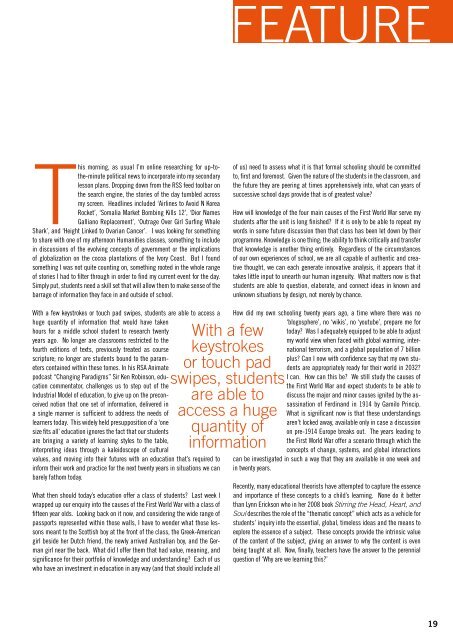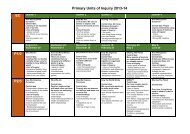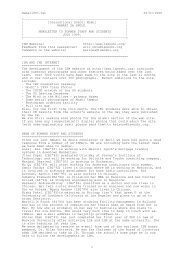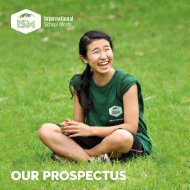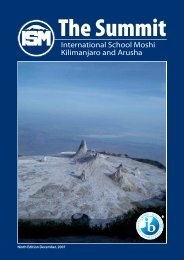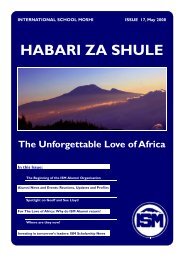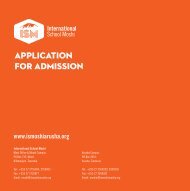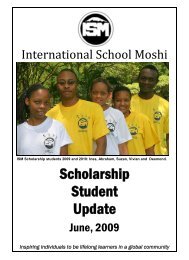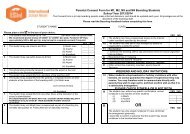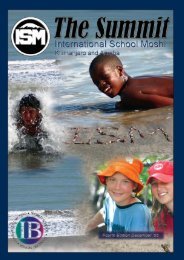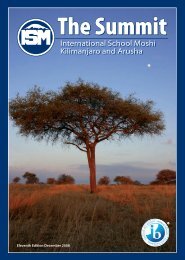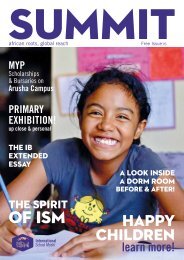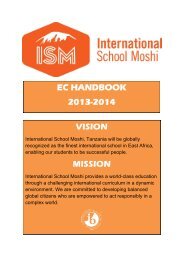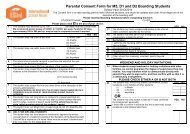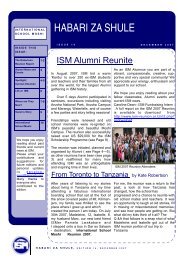June 2012 (5Mb) - International School Moshi
June 2012 (5Mb) - International School Moshi
June 2012 (5Mb) - International School Moshi
You also want an ePaper? Increase the reach of your titles
YUMPU automatically turns print PDFs into web optimized ePapers that Google loves.
FEATURE<br />
This morning, as usual I’m online researching for up-tothe-minute<br />
political news to incorporate into my secondary<br />
lesson plans. Dropping down from the RSS feed toolbar on<br />
the search engine, the stories of the day tumbled across<br />
my screen. Headlines included ‘Airlines to Avoid N Korea<br />
Rocket’, ‘Somalia Market Bombing Kills 12’, ‘Dior Names<br />
Galliano Replacement’, ‘Outrage Over Girl Surfing Whale<br />
Shark’, and ‘Height Linked to Ovarian Cancer’. I was looking for something<br />
to share with one of my afternoon Humanities classes, something to include<br />
in discussions of the evolving concepts of government or the implications<br />
of globalization on the cocoa plantations of the Ivory Coast. But I found<br />
something I was not quite counting on, something rooted in the whole range<br />
of stories I had to filter through in order to find my current event for the day.<br />
Simply put, students need a skill set that will allow them to make sense of the<br />
barrage of information they face in and outside of school.<br />
of us) need to assess what it is that formal schooling should be committed<br />
to, first and foremost. Given the nature of the students in the classroom, and<br />
the future they are peering at times apprehensively into, what can years of<br />
successive school days provide that is of greatest value?<br />
How will knowledge of the four main causes of the First World War serve my<br />
students after the unit is long finished? If it is only to be able to repeat my<br />
words in some future discussion then that class has been let down by their<br />
programme. Knowledge is one thing; the ability to think critically and transfer<br />
that knowledge is another thing entirely. Regardless of the circumstances<br />
of our own experiences of school, we are all capable of authentic and creative<br />
thought, we can each generate innovative analysis, it appears that it<br />
takes little input to unearth our human ingenuity. What matters now is that<br />
students are able to question, elaborate, and connect ideas in known and<br />
unknown situations by design, not merely by chance.<br />
With a few keystrokes or touch pad swipes, students are able to access a<br />
huge quantity of information that would have taken<br />
hours for a middle school student to research twenty<br />
years ago. No longer are classrooms restricted to the<br />
fourth editions of texts, previously treated as course<br />
scripture; no longer are students bound to the parameters<br />
contained within these tomes. In his RSA Animate<br />
podcast “Changing Paradigms” Sir Ken Robinson, education<br />
commentator, challenges us to step out of the<br />
Industrial Model of education, to give up on the preconceived<br />
notion that one set of information, delivered in<br />
a single manner is sufficient to address the needs of<br />
learners today. This widely held presupposition of a ‘one<br />
size fits all’ education ignores the fact that our students<br />
are bringing a variety of learning styles to the table,<br />
interpreting ideas through a kaleidoscope of cultural<br />
values, and moving into their futures with an education that’s required to<br />
inform their work and practice for the next twenty years in situations we can<br />
barely fathom today.<br />
What then should today’s education offer a class of students? Last week I<br />
wrapped up our enquiry into the causes of the First World War with a class of<br />
fifteen year olds. Looking back on it now, and considering the wide range of<br />
passports represented within those walls, I have to wonder what those lessons<br />
meant to the Scottish boy at the front of the class, the Greek-American<br />
girl beside her Dutch friend, the newly arrived Australian boy, and the German<br />
girl near the back. What did I offer them that had value, meaning, and<br />
significance for their portfolio of knowledge and understanding? Each of us<br />
who have an investment in education in any way (and that should include all<br />
With a few<br />
keystrokes<br />
or touch pad<br />
swipes, students<br />
are able to<br />
access a huge<br />
quantity of<br />
information<br />
How did my own schooling twenty years ago, a time where there was no<br />
‘blogosphere’, no ‘wikis’, no ‘youtube’, prepare me for<br />
today? Was I adequately equipped to be able to adjust<br />
my world view when faced with global warming, international<br />
terrorism, and a global population of 7 billion<br />
plus? Can I now with confidence say that my own students<br />
are appropriately ready for their world in 2032?<br />
I can. How can this be? We still study the causes of<br />
the First World War and expect students to be able to<br />
discuss the major and minor causes ignited by the assassination<br />
of Ferdinand in 1914 by Gamilo Princip.<br />
What is significant now is that these understandings<br />
aren’t locked away, available only in case a discussion<br />
on pre-1914 Europe breaks out. The years leading to<br />
the First World War offer a scenario through which the<br />
concepts of change, systems, and global interactions<br />
can be investigated in such a way that they are available in one week and<br />
in twenty years.<br />
Recently, many educational theorists have attempted to capture the essence<br />
and importance of these concepts to a child’s learning. None do it better<br />
than Lynn Erickson who in her 2008 book Stirring the Head, Heart, and<br />
Soul describes the role of the “thematic concept” which acts as a vehicle for<br />
students’ inquiry into the essential, global, timeless ideas and the means to<br />
explore the essence of a subject. These concepts provide the intrinsic value<br />
of the content of the subject, giving an answer to why the content is even<br />
being taught at all. Now, finally, teachers have the answer to the perennial<br />
question of ‘Why are we learning this?’<br />
19


